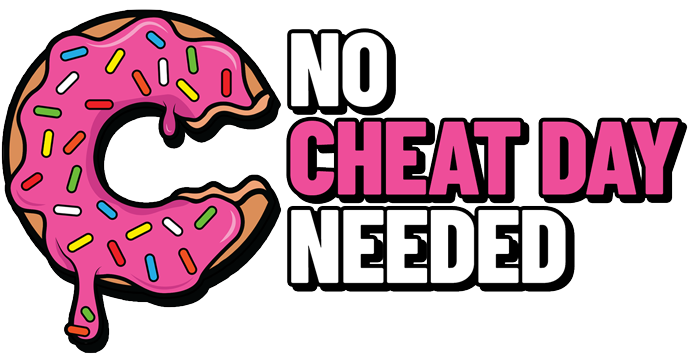Ranking Every Fast Food Burger to Find The Healthiest Option
If eating healthy is the goal, then you might think fast food burgers are off limits. But each burger option is very different, and some are certainly better than others.
In this post, we’re ranking every single popular fast food burger to find out once and for all which is the healthiest.
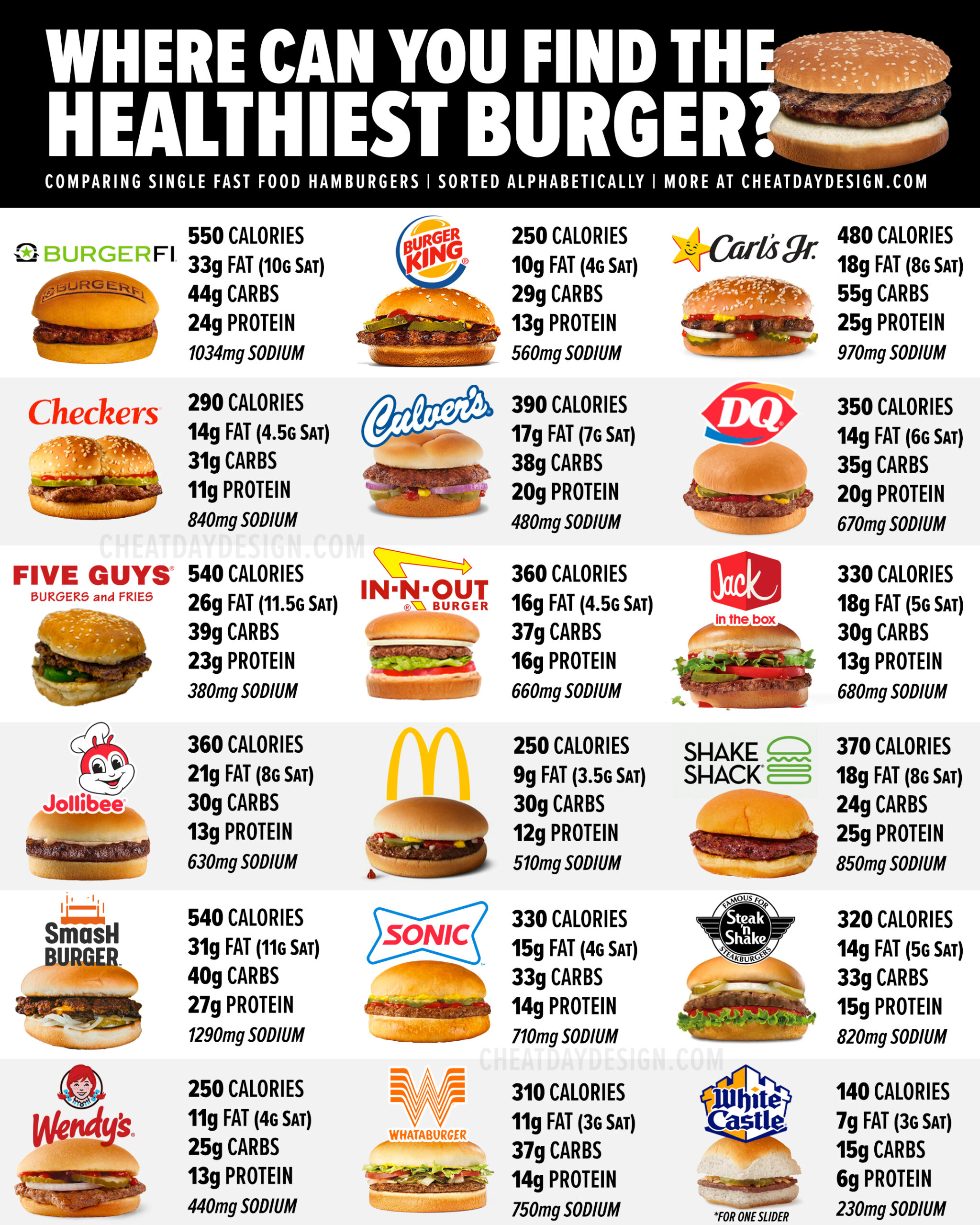
Highlights
- Using our unique formula to find the most well-rounded fast food burger, the top 3 “healthiest” options are Shake Shack, McDonald’s, and Wendy’s
- The least healthy fast food burger options come from Five Guys, Smash Burger, and BurgerFi
- Explore all of these options and more in my Fast Food Nutrition Calculator
Now, before we fully dive in here, I’ll acknowledge that we all define the term “healthy” differently. I’m going to base my ranking on a variety of factors in an effort to find the most well-rounded options, but what one person considers healthy may not apply to you.
For example, one person might consider something very low in saturated fat to be the healthier option, but another person might consider a burger with more protein and slightly more saturated fat to be the better option.
There are no right or wrong answers here- all I can do is lay out the nutrition facts to the best of my ability and let you make your own conclusions.
The Healthy Burger Formula (How The Ranking Was Determined)
Since we all define “healthy” differently, there is no single criterion I can use to tell you what the healthiest option truly is.
Here’s a breakdown of the criteria I used to rank the healthiest fast food burgers:
Calorie Score: We all know calories matter, but they’re not everything. Rather than simply favoring the lowest-calorie options, I used a proportional scale that rewards lower-calorie burgers without unfairly penalizing moderate options.
Protein Quality: A good burger should give you quality protein. I measured this two ways:
- Protein efficiency (protein grams per 100 calories)
- Protein-to-carb ratio (which helps identify more satiating options)
Fat Quality: Not all fat is bad! I focused specifically on saturated fat content, which a lot of people try to limit, with higher scores for burgers with less saturated fat.
Sodium Content: Lower sodium burgers scored higher, with top points for options under 600mg.

I combined these scores to find burgers that offer the best overall nutritional balance. While this doesn’t account for everything (like ingredient quality, processing methods, or micronutrients), it gives you a practical way to make an informed decision around your nutrition goals.
For those interested in the details, here’s the exact formula used:
Final Score = Calorie Score + Protein Efficiency Score + Saturated Fat Score + Protein-to-Carb Ratio Score + Sodium Score
- Calorie Score = (600 – Calories)/600 × 10 *600 is the highest end of the scale we are looking at
- Protein Efficiency Score = (Protein/Calories) × 100
- Saturated Fat Score = 3 points for ≤4g, 2 points for 4.1-8g, 1 point for >8g
- Protein-to-Carb Ratio Score = (Protein/Carbs) × 5
- Sodium Score = 3 points for ≤600mg, 2 points for 601-1000mg, 1 point for >1000mg
When these factors were taken into account, here is how each fast food chain scored:
- Shake Shack (18.8)
- McDonald’s (18.63)
- Wendy’s (18.63)
- Burger King (18.27)
- White Castle (19.96)
- DQ (16.74)
- Culver’s (16.26)
- Whataburger (16.24)
- Steak ‘n Shake (15.63)
- Sonic (14.86)
- Checkers (14.73)
- In-N-Out (14.6)
- Jack in the Box (14.61)
- Jollibee (12.78)
- Carl’s Jr. (12.48)
- Five Guys (12.21)
- Smash Burger (11.38)
- BurgerFi (9.92)
It’s also worth noting that we are looking at single hamburgers ordered as-is, without substituting any of the condiments.
Sure, some burgers are larger than others, and some might contain a “special” sauce, so it’s up to your discretion if you want to look into these options any further. My goal was to keep things as simple as possible!
Here’s the full guide once more, and I will break down each individual option in more detail below…

The Rankings (From Most to Least Healthy)
1. Shake Shack

Hamburger: 370 Calories, 18g Fat (8g Sat), 24g Carbs, 25g Protein (Sodium: 850mg)
Taking the top spot is Shake Shack, offering a burger that balances a moderate calorie count with impressive protein content. Their burger has the best protein-to-carb ratio on our list, making it a surprisingly solid nutritional choice. Shake Shack provides a slightly more gourmet fast-food experience, so it’s a bit different from other options on this list.
The saturated fat and sodium content are on the higher side, which is something to be mindful of. But if you’re looking for a burger that will actually keep you full without a massive amount of carbs, this is your best bet.
2. McDonald’s
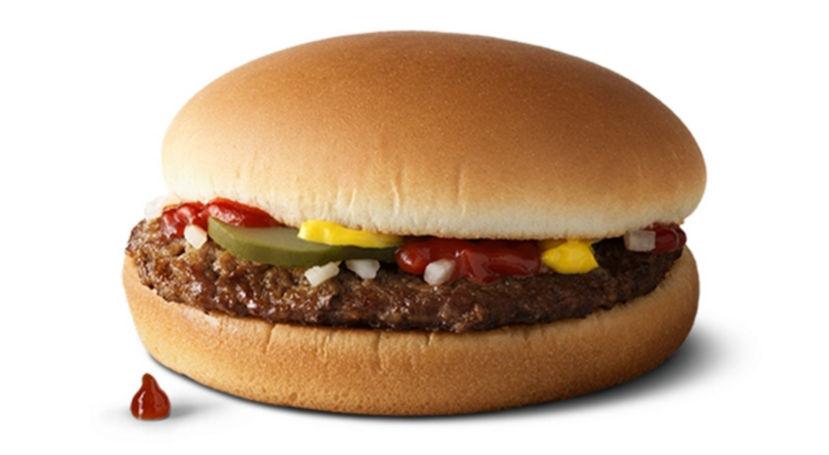
Hamburger: 250 Calories, 9g Fat (3.5g Sat), 30g Carbs, 12g Protein (Sodium: 510mg)
The McDonald’s Hamburger is a classic, simple choice and ranks as the second healthiest burger on our list. With 250 calories and just 3.5g of saturated fat, it’s a lighter option for a fast-food burger. The 12g of protein is fair, helping to keep you satisfied without excessive calories.
The burger keeps sodium in check at 510mg, which is a plus compared to many other fast-food options. It’s a straightforward, no-nonsense burger that provides a familiar taste without piling on too many calories or too much sodium.
3. Wendy’s

Jr. Hamburger: 250 Calories, 11g Fat (4g Sat), 25g Carbs, 13g Protein (Sodium: 440mg)
Wendy’s Jr. Hamburger is tied for second place as one of the best options for those seeking a lower-calorie burger without skimping on taste. At just 250 calories, it’s a reasonable choice when you’re keeping an eye on your caloric intake. The protein content is decent at 13g, which can help keep you satisfied until your next meal.
The 11g of fat is moderate, and the sodium content is surprisingly reasonable at 440mg – one of the lower counts on our list. Wendy’s prides itself on using fresh, never-frozen beef, which may also be a consideration in your search for “healthy.”
4. Burger King
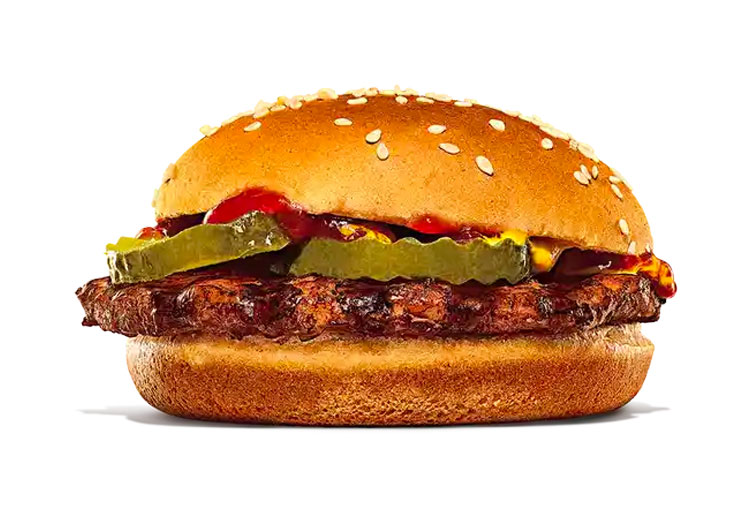
Hamburger: 250 Calories, 10g Fat (4.6g Sat), 29g Carbs, 13g Protein (Sodium: 560mg)
The Burger King Hamburger ties for third with its balanced 250-calorie profile. With 13g of protein and just 10g of fat, it makes for a solid choice when you’re watching your calorie intake but still want to enjoy a fast food burger.
With a sodium content of 560mg, it’s still on the lower side in the fast-food world. And if you’re choosing between similar calorie options, Burger King’s flavor may be the deciding factor (if you ask me, it’s one of the better options out there).
5. White Castle

Original Slider: 140 Calories, 7g Fat (3g Sat), 15g Carbs, 6g Protein (Sodium: 230mg)
White Castle’s slider is the smallest option on our list, making it perfect for portion control. At just 140 calories and 6g of protein, it’s not going to fill you up on its own, but that can be an advantage. You can enjoy one as a snack, or customize your meal by having two or three (still keeping calories reasonable).
The slider has the lowest sodium on our list at just 230mg, which is not a surprise considering the size. The protein-to-carb ratio isn’t stellar due to the tiny patty and relatively larger bun, but the overall nutritional profile is solid for its size.
6. Dairy Queen

Hamburger: 350 Calories, 14g Fat (6g Sat), 35g Carbs, 20g Protein (Sodium: 670mg)
The Dairy Queen Hamburger offers a decent choice with 350 calories and a solid 20g of protein, making it a fulfilling option without tipping the calorie scale too high. With 6g of saturated fat, it’s in the middle range for this list.
The 20 grams of protein is impressive compared to other options in this calorie range, which means DQ likely uses a decent quality beef for their patties.
7. Culver’s

Single ButterBurger: 390 Calories, 17g Fat (7g Sat), 38g Carbs, 20g Protein (Sodium: 480mg)
Culver’s is known for its ButterBurgers, which are named for the lightly buttered, toasted buns. Despite what the name might suggest, the Single ButterBurger is actually a solid choice. With 390 calories and 20g of protein, it offers a pretty good balance.
What’s particularly impressive is the relatively low sodium content (480mg) for a burger this size – one of the better sodium-to-calorie ratios on our list.
8. Whataburger

Whataburger Jr.: 310 Calories, 11g Fat (3g Sat), 37g Carbs, 14g Protein (Sodium: 750mg)
Opting for a Whataburger Jr. will save you calories compared to the classic Whataburger. With 310 calories and just 3g of saturated fat, it’s one of the lower saturated fat options on our list while still providing a decent14g of protein.
The sodium comes in at 750mg, which is middle-of-the-pack for fast food burgers. If you’re a fan of Whataburger’s burgers but want to watch your calories, the Jr. is a smart choice.
9. Steak ‘n Shake

Single Steakburger: 320 Calories, 14g Fat (5g Sat), 33g Carbs, 15g Protein (Sodium: 820mg)
The Single Steakburger from Steak ‘n Shake is a straightforward choice with 320 calories and 15g of protein. With 5g of saturated fat, it falls in the middle range for our burger lineup.
The sodium is a bit high at 820mg, so keep that in mind if you’re watching your sodium intake. However, the overall nutrition facts still land it in our top 10.
10. Sonic

Jr. Hamburger: 330 Calories, 15g Fat (4g Sat), 33g Carbs, 14g Protein (Sodium: 710mg)
Sonic’s Jr. Hamburger comes in at 330 calories with 14g of protein, making it a pretty solid option for a smaller appetite. With just 4g of saturated fat, it’s on the lower end for saturated fat content, too.
While not the most impressive in terms of protein-to-carb ratio, it’s a decent option if you’re at Sonic and looking for something simpler than some of their more elaborate menu items.
11. Checkers

Hamburger: 290 Calories, 14g Fat (4.5g Sat), 31g Carbs, 11g Protein (Sodium: 840mg)
Finding a lower-calorie option at Checkers is pretty easy with their classic Hamburger, which sits at just 290 calories. It’s a straightforward choice for those looking for a basic fast-food burger without the extra calories.
The 11g of protein isn’t going to win any awards, and the sodium is on the higher side at 840mg, which is something to consider if you’re watching your salt intake.
12. In-N-Out

Hamburger: 360 Calories, 16g Fat (4.5g Sat), 37g Carbs, 16g Protein (Sodium: 660mg)
In-N-Out is famous for its fresh ingredients and simple, delicious burgers. While most of their burgers contain multiple patties and many toppings, the simple hamburger sits in the middle of our list.
One of In-N-Out’s advantages is its customization options (you can use my In-N-Out calculator here): the famous “protein style” option (replacing the bun with lettuce) can significantly reduce the carb count if you want to bring the calories and carbs down even further.
13. Jack in the Box

Hamburger: 330 Calories, 18g Fat (5g Sat), 30g Carbs, 13g Protein (Sodium: 680mg)
Jack in the Box’s basic Hamburger comes in at 330 calories with 13g of protein. The 18g of total fat is definitely on the high side, but with 5g of saturated fat, it’s not the worst offender on our list.
While not the leanest option available, it’s not the “worst” option on our list, so to speak.
14. Jollibee

Yumburger: 360 Calories, 13g Fat (8g Sat), 30g Carbs, 13g Protein (Sodium: 630mg)
Looking for something different in the world of fast food? Jollibee’s Yumburger is definitely unique. At 360 calories with 13g of protein, it’s nutritionally similar to many others on our list, but the flavor certainly sets it apart.
15. Carl’s Jr.

Hamburger: 480 Calories, 18g Fat (8g Sat), 55g Carbs, 25g Protein (Sodium: 970mg)
Carl’s Jr.’s Hamburger is one of the more substantial options on our list at 480 calories. The good news is that it also delivers an impressive 25g of protein, making it one of the highest-protein options available.
The downside is the high carb count (55g) and sodium content (970mg), plus 8g of saturated fat. This burger ranked lower on our health scale not because it’s inherently “bad,” but because of all of those additional factors.
16. Five Guys

Little Hamburger: 540 Calories, 26g Fat (11.5g Sat), 39g Carbs, 23g Protein (Sodium: 380mg)
Five Guys’ Little Hamburger comes in at 540 calories, making it one of the heftier options on this list. The protein is relatively high, but so is the fat and saturated fat.
However, the sodium is surprisingly low for a fast-food burger at just 380mg (actually one of the lowest on our list).
Five Guys’ commitment to fresh ingredients and customization options remains one of their strong points. If you’re going to splurge on calories, at least you’re getting quality ingredients and solid protein content here.
17. Smash Burger

Classic Smash Without Cheese: 540 Calories, 31g Fat (11g Sat), 40g Carbs, 27g Protein (Sodium: 1290mg)
Smash Burger’s classic option comes in tied for highest calorie count on our list at 540 calories. The silver lining is its impressive 27g of protein, which is the highest of any option on this list.
It’s worth noting that this is for a Classic Smash and not an All-American Smash, the latter being slightly lower in calories due to the removal of the classic smash sauce. For these purposes, I stuck with the Classic Smash since that is what a “standard” order would contain.
18. BurgerFi

BurgerFi Hamburger: 550 Calories, 33g Fat (10g Sat), 44g Carbs, 24g Protein (Sodium: 1034mg)
Landing in our final spot is the BurgerFi Cheeseburger. At 550 calories with 33g of fat (10g saturated), it’s one of the more indulgent options on our list. The 24g of protein is great, but not enough to offset the high calorie, fat, and sodium content in the ranking formula.
The sodium level is very high at 1034mg, which may be a deciding factor for many people. BurgerFi does pride itself on using higher-quality, all-natural ingredients, which is worth considering beyond just the numbers. Sometimes quality ingredients justify a few extra calories, depending on what you are looking for.
Healthy Fast Food Ordering Tips
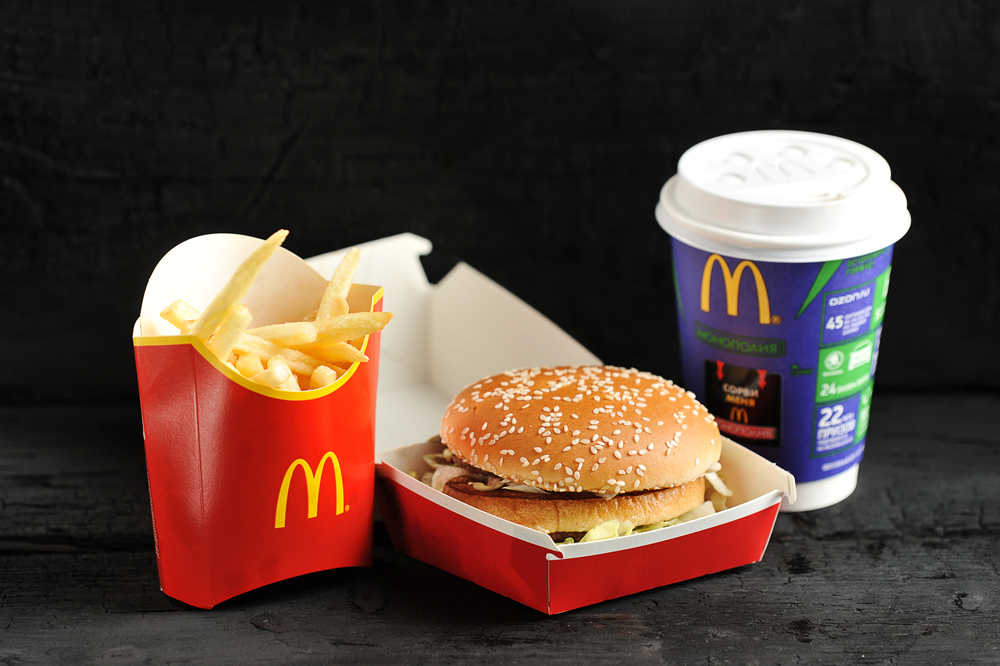
Trying to eat “healthy” while ordering a fast food burger can feel difficult, but I’m here to simplify it. We already broke down the various options out there, but what if you’re faced with a decision that isn’t a part of this list? Here are my tips:
1. Opt for a Single Patty:
Most fast food restaurants offer burgers with multiple patties. If you’re looking to reduce calorie and fat intake, stick to a single patty option.
2. Skip or Limit Condiments:
Condiments like mayonnaise, ketchup, or special sauces can add extra calories, sugar, and fat. Opt for mustard or hot sauce keep your calories very low, or be careful to use a light amount of condiments.
3. Add Extra Protein:
If you’re looking to increase your protein intake, consider adding an extra patty. While that will certainly bump up the calories & fat, if muscle building is the goal, the extra calories will be worth the protein.
4. Choose Leaner Meats:
If you simply can’t make a burger work, you can pivot to a similar, but different sandwich entirely. For example, the Grilled Chicken Sandwich from Whataburger is a great high-protein, lower-calorie choice.
5. Go Bun-less or Opt for a Lettuce Wrap:
Skipping the bun or choosing a lettuce wrap can significantly cut down on calories and carbs. This is a great option for those following a low-carb or ketogenic diet. You should not be afraid of carbs in bread, but for anyone eating low-carb, it’s a great option.
6. Add Extra Veggies:
Load up your burger with extra lettuce, tomatoes, onions, pickles, or other available veggies to increase the nutrient content without adding many extra calories.
7. Be Mindful of Side Choices:
Pair your burger with a side salad, fruit, or other healthier side options instead of fries or onion rings to keep the overall calorie count of your meal down if you’re watching your calories.
8. Watch Portion Sizes:
Opt for smaller, regular, or junior-sized burgers to keep your calorie intake in check. For instance, the Jr. Jumbo Jack from Jack in the Box is a lower-calorie option compared to its larger counterpart.
Many fast food restaurants will have different sizes and you may not even notice. Even Wendy’s has a Jr. Hamburger and a “Dave’s Single”, which sound the same, but are very different in size and calories.
With a little creativity, you can make any fast food burger work for your goals!
Conclusion: Can Fast Food Burgers Be Healthy?

Trying to find healthier options when ordering fast food can feel like an impossible task, but I hope this post was able to help simplify it a bit.
While a fast-food burger may never be as healthy as a home-cooked meal, knowing the nutritional information of what’s available can help you make better on-the-go decisions.
Remember, what’s “healthy” varies from person to person, and the equation I used here is just one way to determine which options are healthier than others. Be sure to make decisions on what is the most important to you!
But now, the next time you find yourself at a fast-food joint, you’ll be well-equipped to make a choice that’s right for you.
